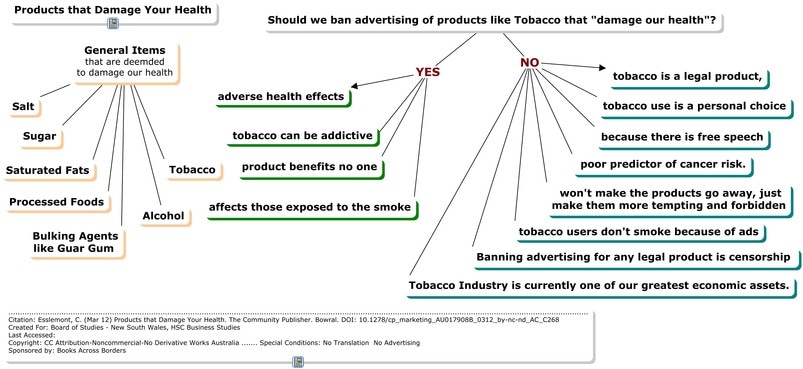TOPIC 2: MARKETING
Influences on Marketing
• factors influencing customer choice – psychological, sociocultural, economic, government
• consumer laws
– deceptive and misleading advertising
– price discrimination
– implied conditions
– warranties
• ethical – truth, accuracy and good taste in advertising, products that may damage health, engaging in fair competition, sugging
• consumer laws
– deceptive and misleading advertising
– price discrimination
– implied conditions
– warranties
• ethical – truth, accuracy and good taste in advertising, products that may damage health, engaging in fair competition, sugging
Factors influencing customer choice
- Psychological: see the article How Psychological Factors Affect Consumer Behaviour
- Sociocultural: see Cultural Factors Affecting Consumer Behaviour and Social Factors Affecting Consumer Behaviour
- Economic: Economic Factors That Affect Consumer Behaviour
- Government: There are many laws and regulatory bodies regarding price and competition. There are also taxes and tariffs affecting the price of goods and the income of consumers. However, other policies come into play. For instance, policies providing incentives to install solar panels can influence customers' energy expenditure. Government bodies advertising for people to drink less alcohol could reduce consumer spending on alcohol. Another example is with the government installation of the National Broadband Network (NBN) there will probably be an increase in the number of consumers connecting to the Internet and thus there may also be an increase in online shopping and streaming of movies and TV shows.
Consumer Laws
For a comprehensive look at consumer laws go to the ACCC Website for Business. Consumer laws used to be based on state Trade Practice Acts but since 1 Jan 2011 there is The Australian Consumer Law (ACL). After a review in 2017, changes to the ACL were made in 2018.
However, to stick to the syllabus terms, definitions have been hyperlinked:
Deceptive and misleading advertising - see the examples of Trivago (hotel booking site), Dulux (paint company) and Coles with its "freshly baked" bread claims
Price discrimination is no longer against the law but is still an issue, as seen in the geographic price differences between Australia and the USA, eg Apple, Netflix (hyperlinked smh article by the awesome economics writer, Peter Martin)
Implied conditions - only applies to purchases prior to 2011 - replaced by consumer guarantees
Warranties
However, to stick to the syllabus terms, definitions have been hyperlinked:
Deceptive and misleading advertising - see the examples of Trivago (hotel booking site), Dulux (paint company) and Coles with its "freshly baked" bread claims
Price discrimination is no longer against the law but is still an issue, as seen in the geographic price differences between Australia and the USA, eg Apple, Netflix (hyperlinked smh article by the awesome economics writer, Peter Martin)
Implied conditions - only applies to purchases prior to 2011 - replaced by consumer guarantees
Warranties
Ethical influences
- truth, accuracy and good taste in advertising
TASK: Go to the Advertising Standards Bureau and examine the codes and initiatives they administer. Also look at their case studies. Which examples of advertising do you think don't meet truth, accuracy and good taste in advertising?
- products that may damage health
TASK: Argue what restrictions should be in place for marketing products that may damage your health.
- engaging in fair competition - the ACCC ensures businesses do not engage in anti-competitive behaviour that is against the law.
- sugging - SUG = Selling Under Guise - Think of it as businesses wearing the disguise of a competition or survey, when really, under the mask of the competition or survey, they are data gathering so later they can give you the hard sell. Read the Crikey article for more information, Dodgy market research: when the phone surveys turn into the hard sell (unfortunately you need to subscribe for full access).

